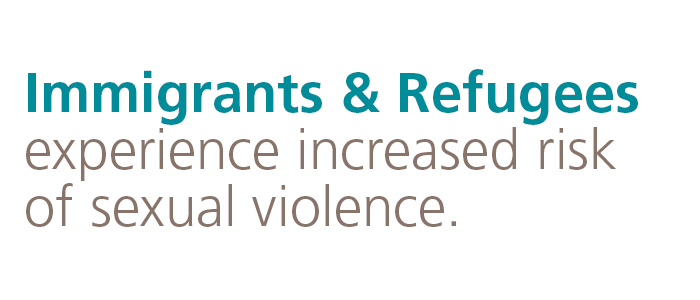By Kayla Houser
Outreach Coordinator, PCAR
On Friday, President Donald Trump signed an executive order suspending refugee resettlement and halting immigration into the U.S by citizens from seven counties—Iran, Iraq, Libya, Somalia, Sudan, Syria and Yemen.
We are committed to immigrant and refugee sexual assault survivors and addressing the potential effects the recent changes will have on sexual assault survivors.
We stand in solidarity with immigrants and refugees that flee persecution or a fear of persecution. In their home country, refugees often face discrimination and abuse on account of their race, religion, nationality, membership in a particular social group, or political opinion. The recently signed executive order, which bars entry into the U.S. for some refugees who are awaiting resettlement, and entry to citizens of seven other countries, limits access to safety for those fleeing violence and persecution. We are reminded of our commitment to furthering social justice and working to dismantle oppression in all its forms. Marginalization and persecution of any group or any individual undermines efforts to end sexual violence.
We recognize that many people flee their home as a matter of life and death to seek refuge in the United States. Many Individuals are fleeing unsafe or war-torn countries or places where they are the targets of persecution. Living within countries in conflict puts individuals at increased risk for rape, torture, and human trafficking. Sexual violence against is well-documented as a systematic tactic of war and abuse to maintain power in places of unrest.
Fleeing from conflict zones to refugee camps does not eliminate the risk of further sexual victimization. Refugees disclose that camps are often places for rape, forced prostitution, forced marriage, and trafficking, where there is limited security in close communal spaces. Refugee women are at a disproportionally higher risk for violence than any other population of women in the world.
Refugees who flee persecution often experience a sustained trauma response. This trauma is compounded by the ongoing implicit or direct threat of sexual victimization at every stage of their journey to safety. A researcher evaluated refugees seeking asylum in Germany, and found that more than 70 percent had witnessed violence and that about 50 percent were victims of violence themselves. Many refugees report symptoms of Post-Traumatic Stress Disorder and trauma exposure including nightmares, loss of appetite, or anxiety. Advocating for policies and programs that create access to safety for refugees is part of our mission-driven work to eliminate sexual violence and to support survivors of sexual assault.
We support paths for immigrants and refugees that foster help, hope and healing from the trauma of persecution and from the threats and experiences of sexual violence. We are committed to all survivors of sexual violence, including those who seek protection in our county. We work to eliminate all forms sexual violence including violence perpetrated abroad.
The recent changes in procedures for immigrants and refugees are a Call to Action. We recommit to work on behalf of those most at risk for victimization and least able to access safety and services. For those living in our communities that are affected or unsure about the recent changes, we encourage you to reach out to the Pennsylvania Immigration Resource Center at (717) 600-8099, who can connect you to local resources. Additionally, all Pennsylvania rape crisis centers can provide free, confidential, and 24/7 support to survivors of sexual violence and their families.






